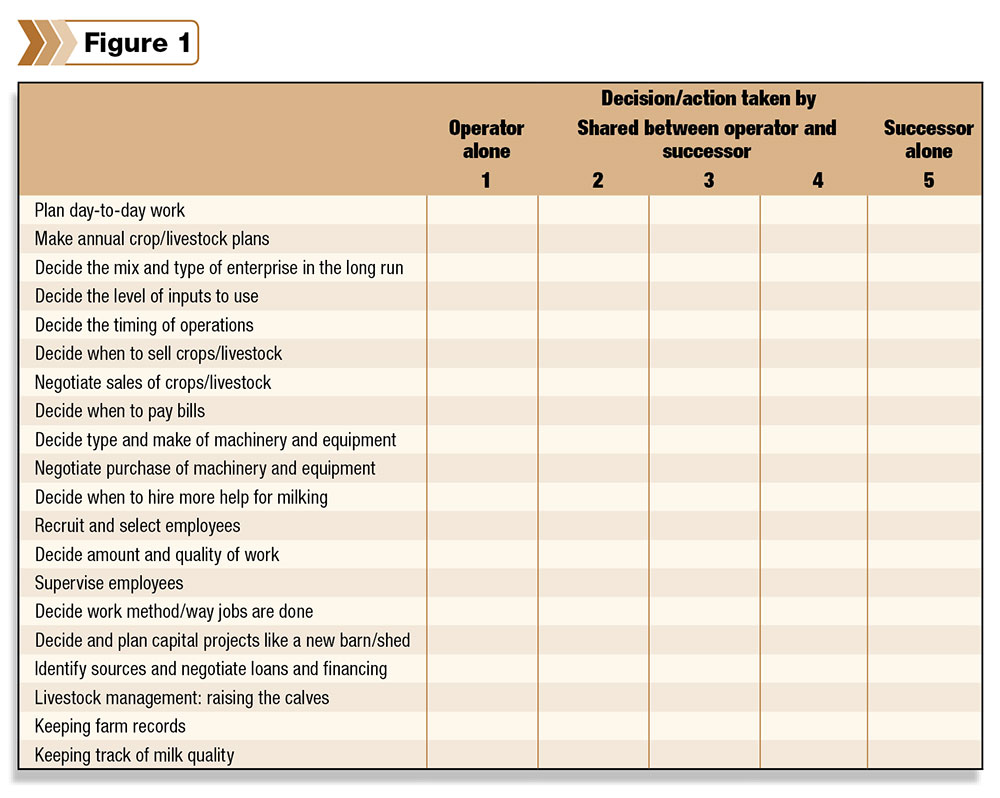Here’s a practical tool you can modify to your dairy practices to help you figure out on paper who is really making the decisions.
The International Farm Transfers study wanted to look at the process of the transfer of skills and knowledge to the next generation.
When I work with younger farmers, they are keenly aware that Dad is not letting go of some decisions very easily.

So I offer this worksheet (Figure 1) from Dr. John Baker’s work at the University of Iowa Beginning Farmers Club: Distributions of Managerial Tasks on the Farm: Founder and Successor evaluation.
Click here or on the image above to view it at full size in a new window.
Identify on a scale of 1 to 5 who has the ultimate decision.
A response of 1 means that the operator (founder) had retained power over that task or skill, and five means the successor had complete control over that aspect of the farming operation.
Use this worksheet on your farm to get a picture of the way decisions are made in your business.
The list of tasks also serves as a great learning plan to identify the tasks you might want to teach or mentor to the next generation.
Daughters-in-law who are not used to farm life might also find this list helpful in understanding the complex decision-making that needs to be done by the farm team.
Perhaps there are some skills she brings to the farm team that are being overlooked.
Making decisions can be a simple process when you understand the basic structure of decision-making:
1. Identify the problem or issue that needs to be solved.
2. Gather all the possible options and resources for a solution.
3. Choose a course of action and resource to solve the problem.
4. Act … focus and execute that option to resolve the issue.
5. Evaluate … was this a good choice, or what would we do differently next time?
Okay, I know those five steps are overly simplistic, but that’s what is wired in my brain from my Management 101 courses at university, and it works for me. It is also the basis of the process we use in mediation.
Members of the farm team need to make time to ponder how to solve these issues and the problems of managing their profitable businesses.
I encourage you to cut out and copy Figure 1. Have everyone on the team evaluate what decisions they make and the decision-making areas where they would like to gain more expertise.
It’s a very sad day when I discover in a coaching scenario that a young farm team member has been involved as labour for more than a decade and yet has never seen the financial statements of the operation.
You don’t jump from being the hired man to “partner” with no clue about the balance sheet.
Time races on. It is time to focus on the business, not just be busy “in the business.”
If your relationship to your spouse is strained due to the overwhelming stress of decisions you know need to be addressed, perhaps this list will help you focus your talks with him or her so that you de-stress the tension and attack the issues together.
Beware that avoiding making decisions is really a decision. “Not making decisions is in fact a decision of denial.”
In Baker’s study, the areas most likely controlled by the successor included livestock management, recruiting and selecting employees, and keeping farm records.
The tasks most shared evenly were deciding work method, deciding timing of operations and making annual plans.
The greatest control of the operator or founder was in the areas of identifying sources and negotiating loans, and determining when to pay bills.
This is a cash-flow money issue. Fights about Dad being too tight with the cash or not paying enough wages are based on who is the ultimate decision-maker in this area.
It gets really interesting when Grandpa is still calling the shots, the successor is 50-something, and the next-generation grandson also wants to learn how to make decisions to gain management skills. Take time now to sort this out before it gets that far.
Call me at (866) 848-8311 or email to share decision-making tips that work well in your operation.
Remember, it’s your farm, your family and your choice. Work on making great choices. PD
Elaine Froese, CAFA, CHICoach, farms near Boissevain, Manitoba, and works with farm families across Canada.








